
The Model 1903A4 was the first issued sniper rifle to all U.S. military services during World War II. It had a 2.75X M73B1 Telescopic Sight and fired the powerful .30-06 cartridge. Images courtesy of the author.
To learn more, visit www.northcapepubs.com or email [email protected].
To purchase a Model 1903 rifle on GunsAmerica.com, click this link: https://www.gunsamerica.com/Search.aspx?T=Springfield%201903.
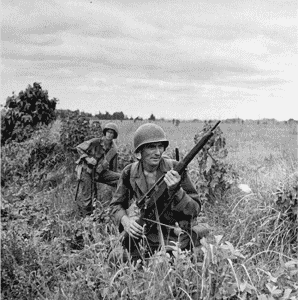
An Army sniper and his observer clearing an area on Luzon, in the Philippines in 1945. U.S. Army Photo.
Editor’s Note: This piece was written by Joe Poyer, author of the book Collecting the American Sniper Rifle 1900 to 1945. If you would like to explore the Model 1903A4 and other U.S. sniper rifles in greater detail, you can obtain a copy of the book from North Cape Publications, Inc., PO Box 1027 Tustin CA 92781. The price is $22.95 plus $5.75 postage.
When the United States military entered World War II in 1941, there was not a single sniper rifle in military inventory. All the sniper rifles developed for use during World War I had long since been disposed of.
In mid-to-late 1942, when U.S. and Allied forces invaded Guadalcanal, the Aleutian Islands and North Africa, the demand for sniper rifles rose loud enough to be heard in the deepest recesses of the War Department.
On the Eastern Front, Nazi and Soviet troops had deployed thousands of sniper rifles to great effect. The British and Canadians had resurrected World War I-vintage Enfields and Pattern 1914 sniper rifles and were using them to good effect in the mountains, plains and deserts of Egypt, Libya and Tunisia. So, this left the question of what the Americans would field.
The 1903A4 Sniper Rifle Project
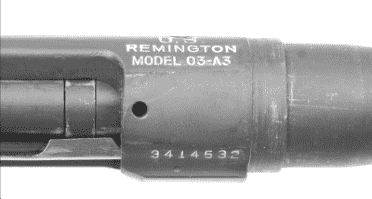
The Model 1903A3 designation was left on the Model 1903A4 receiver. It has been suggested that any rifles that failed inspection as a sniper rifle could be returned to the factory and reissued as an infantry rifle.
The U.S. Army’s Ordnance Department decided that a sniper rifle could be made quickly and cheaply based on the Model 1903A3 rifle that was just beginning to come off the production lines at Remington’s plant in Ilion, New York. Problems concerning supply and national priorities delayed the project initially, but by the end of 1943, the new Model 1903A4 sniper rifle began to reach front line troops.
The Model 1903A4 may have been a compromise to get a sniper rifle into the front lines as quickly as possible, but it was certainly serviceable enough. In the Pacific theater, where sight lines were often limited by heavy vegetation, the powerful .30-06 cartridge helped to overcome the somewhat deficient telescopic sight supplied by the small Weaver Corporation of El Paso, Texas. And it was widely used in the European and Italian theaters as well.
The new sniper rifle was essentially a slightly modified Model 1903A3 infantry rifle, which itself was a modification of the venerable Model 1903 Springfield. The changes to the Model 1903A3 had been made to speed up production on more modern equipment than was used at the turn of the 20th century when the Model 1903 was first developed.
So great was the pressure to produce the sniper rifle, speed production and cut costs that the Model 1903A4 receiver continued to be marked Model 1903A3.
M73B1 Telescopic Sight
The telescopic sight was a modified Weaver 330-C commercial product that first appeared on the market in 1930. When selected for military use, it was designated the M73B1 and so marked. It was a 2.75 power scope and could be adjusted for parallax, windage and elevation. The magnification was considered reasonable for its 400- to 500-yard range, but the field of view was only thirty-five yards wide at 100 yard’s distance. In low light, the scope was nearly useless.
The Weaver scope was not the first choice; that had been the Lyman Alaskan Telescopic Sight. But Lyman was engaged in higher priority work and could not meet the Ordnance Department’s delivery requirements.
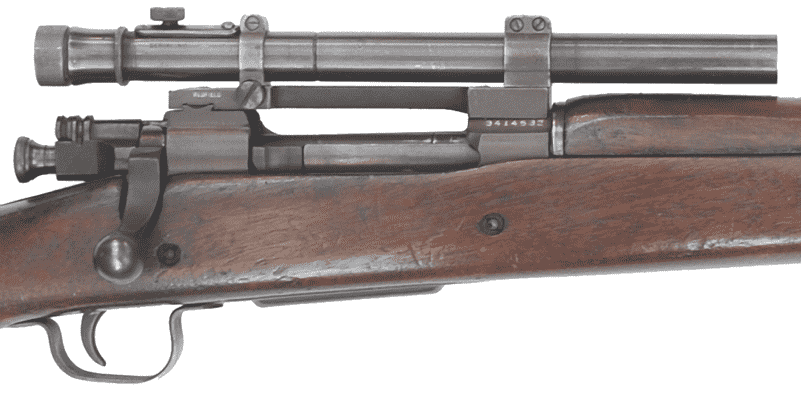
The M73B1 Telescopic Sight was a modification of the Weaver 330-C commercial scope. Most of the nation’s optical manufacturers were engaged in war work when requests for the telescopic sight were announced. Weaver, although a small company in El Paso, Texas, stepped up and managed to maintain sufficient production throughout the war.
The Model 1903A4 sniper rifle was used throughout the war and remained in service through the Korean Conflict until being withdrawn in the mid-1950s. The rifles and scopes were separated and many of the rifles were broken up for parts or sold off through the Civilian Marksmanship Program. Those few Model 1903A4s remaining in inventory (some 588, it was estimated) were ordered destroyed in the early 1990s by the Clinton Administration.
Identifying An Original
The Model 1903A4 has become a popular collector’s acquisition with World War II weapons aficionados, so much so that it has been widely counterfeited. The collector should keep in mind that the vast majority of Model 1903A4s have been reassembled after they left service.
[one_third]
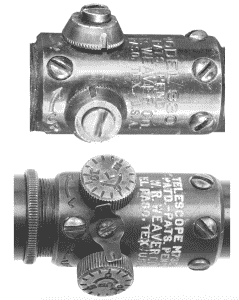
The Weaver 330-S commercial scope is shown above. It has cone-shaped elevation and windage knobs. Below is the Weaver M73B1 telescopic sight. It has drum-shaped elevation and windage knobs, and the nomenclature plate designates it as “Telescope M73B1.”
[/one_third]
[two_third_last]
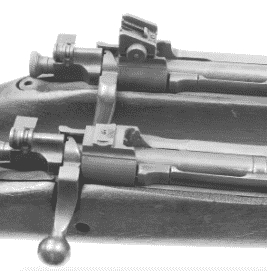
The Model 1903A4 was a modification of the Model 1903A3 Infantry Rifle. The front and rear sights were not installed and the rear of the receiver bridge was milled flat to accept the Redfield Jr. Base.
[/two_third_last]
Authentic Model 1903A4s will show Parkerizing (finish) in the front sight recess as a front sight was never installed (M1903A3 barrels were Parkerized with the front sight installed). Bolt handles were bent to clear the telescopic sight. The “scant stock” (half pistol grip) was installed on all but a few early Model 1903A4s that instead used the last of the prewar “C” stocks with the full pistol grip. If a “C” stock is marked “K” in the magazine cutoff recess, it is a replacement stock made during the war. The barrels were marked “RA” over the Ordnance Department Flaming Bomb and dated from 1-43 to 2-44. All other parts marked “R” were for Remington production.
The telescopic sight is a point of much controversy, but it should not be. All telescopic sights installed on the Model 1903A4 were marked “M73B1”. Elevation and windage adjustment knobs had click stops and were cylindrical and not cone-shaped like the commercial 330-C versions. The scopes were mounted using Redfield Jr. bases and rings. The base is marked “Redfield”, but the rings are not marked. The rings clamped vertically.
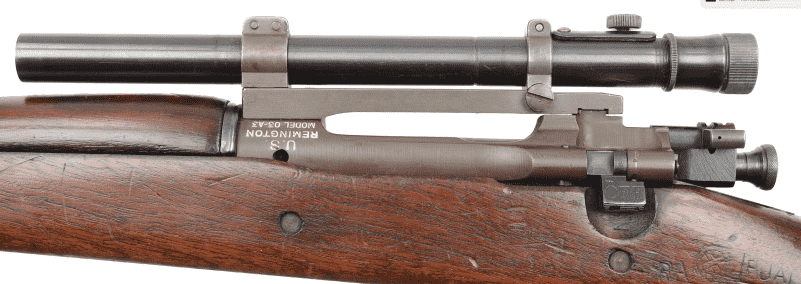
The M73 Telescopic Sight was adjustable for windage and elevation with cylindrical click-stop knobs.
The only exception to the use of the M73B1 were the less than 200 Weaver 330-C commercial scopes used in the very first few Model 1903A4s that Weaver supplied from its inventory to get production started. And later, during the Vietnam War, a few Model 1903A4s dredged out of warehouses were equipped with the M84 Telescopic Sight which was used on the M1D Sniper Rifle.
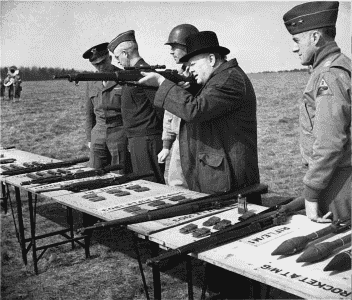
Prime Minister Winston Churchill was always interested in small arms. He is shown here with General Eisenhower inspecting and shooting a selection of infantry weapons, including the new Model 1903A4. U.S. Army Signal Corps photo.
At no time was the Weaver commercial M8 telescopic sight used officially on the Model 1903A4 Sniper Rifle. The Weaver M8 should not be confused with the military M8 which was the designation for the Winchester A5 telescopic sight used on very early sniper rifles in 1918 and through the 1920s, and supplied as aiming aids on some artillery pieces.
Production of the Model 1903A4 occurred in four specific blocks of serial numbers. Any rifle with serial number outside those ranges is standard infantry rifle.
Production ended at Remington in January 1944 and assembly was completed shortly thereafter. The collector should keep in mind that Remington received contracts for spare parts in the following months. Many of these spare parts, especially barrels and “C”-type replacement stocks, have often found their way onto Model 1903A4 sniper rifles of dubious authenticity. As always, the buyer should do his or her due diligence.
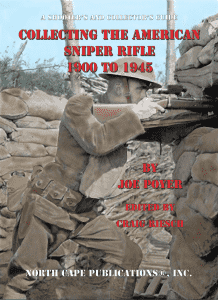
To learn more, visit www.northcapepubs.com or email [email protected].
To purchase a Model 1903 rifle on GunsAmerica.com, click this link: https://www.gunsamerica.com/Search.aspx?T=Springfield%201903.
Editor’s Note: This piece was written by Joe Poyer, author of the book Collecting the American Sniper Rifle 1900 to 1945. If you would like to explore the Model 1903A4 and other U.S. sniper rifles in greater detail, you can obtain a copy of the book from North Cape Publications, Inc., PO Box 1027 Tustin CA 92781. The price is $22.95 plus $5.75 postage.

I have a brand-new A4, only proof fired. No scope mounts or scope. Have the government provenance papers too, showing where it was built.
Plan to sell it, any buyers interested. Expensive.
Wow what a beauty. I understand the effectiveness of semi-auto, but if speed is not a factor these bolt action rifles & 30-06 caliber rounds make such trouble for an enemy… in any century!
I like these old bolt guns. I have two 1903’s, two 1903A3’s that appear unissued or arsenal rebuilt and stored and a very nice A4 that seems to hit all the bells and whistles in the article. It does have an M-84 scope mounted.Also have GI issued M-1C and D. Really enjoy shooting the old snipers. j
Some 1903A4s were used in Vietnam. Some of these seemed to have had the M84 scope mounted, according to photos from that era and examples in military museums. I have one myself. But again, when the M1903A4s were released for sale, the rifles and scopes were released separately. We discuss the M1903A4s with M84 scopes in the book, Collecting the American Sniper Rifle 1900 to 1945.
I have 3 1903s. A “stock” 1903 built on a barreled action found at a yard sale, a Gibbs ’03A4, and a replica Marine Sniper built on a repatriated 1903 that saw service with some overseas ally, possibly Greece. None of these qualify as a collectible, but man, can they shoot!
Navy Boot Camp (1960) issue 1903. Carry it 10 weeks, Drill team/Honor guard. Never used it again after boot. (M-1 & M-14) All great weapons. Tony “Irish” Boot @ USNRTC, Great Lakes, (12/59–3/60 COLD!) CO-4
I bought a 1903 in 1962 for $29.00 Just the standard issues rifle.
would like to have one I had the regular 1903 in 1962
I was introduced to a model 1903 Springfield; when I was at Station military academy, in a 1965. That rifle had not seen the light of day since,WW 2. I t was love at first sight and I have used that type of weapon ever since William